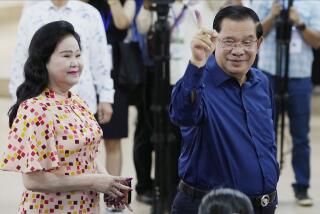Cambodia King Will Be Able to End Parliament
- Share via
PHNOM PENH, Cambodia — Cambodia’s king was given powers Saturday under the country’s draft constitution to dissolve the elected national assembly, despite concern by some lawmakers that he already has too much power.
The decision, made in the fourth day of debate by lawmakers on the charter, increases the already significant powers the constitution allows the king, though it states the monarch is a figurehead leader.
The position of king is being tailor-made for Prince Norodom Sihanouk, the 70-year-old interim head of state who ruled Cambodia for decades before being ousted in a U.S.-backed coup in 1970.
The pertinent article says the king can dissolve Parliament on the advice of the prime minister and the president of the assembly. The power could only be exercised if the assembly already has dissolved the government twice in the same year.
But, like provisions giving the king powers over the executive and judiciary branches, this one leaves the final decision in Sihanouk’s hands.
Assembly members and pro-democracy activists have secretly expressed concerns over whether Sihanouk will abuse the powers the constitution will provide him, as he did during his previous administration.
It is apparent from Sihanouk’s public and private statements in the past few weeks from China, where he is seeking medical treatment for a rectal tumor, that he is dictating at least some of the assembly’s decisions.
But Sihanouk’s son, Prince Norodom Ranariddh, co-chairman during the interim period while the constitution is being drafted, said his father has not made any such demands.
Ranariddh, who is to become the country’s president after the constitution is adopted, said the provision would balance the assembly’s power to dissolve the government.
“This would keep the Parliament from overthrowing the government all the time,” said Ek Sereywath, deputy information minister. “It’s a check and balance of power.”
The assembly, elected in U.N.-organized elections this past May, is to formally take charge after adopting the entire 140-article constitution, probably next week. That will mark the end of the 18-month U.N. peacekeeping operation.
More to Read
Sign up for Essential California
The most important California stories and recommendations in your inbox every morning.
You may occasionally receive promotional content from the Los Angeles Times.













